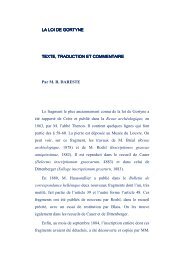CYPRIOT GRAMMAR
CYPRIOT GRAMMAR
CYPRIOT GRAMMAR
Create successful ePaper yourself
Turn your PDF publications into a flip-book with our unique Google optimized e-Paper software.
Chapter 8: The verbs ‘to be’ and ‘to have’<br />
Verbs in Cypriot are always given in the first person singular since there is no indefinite form as in other languages like Spanish or English<br />
which is in one way an advantage because you learn fewer forms of verbs and when you learn a verb you automatically learn how to<br />
conjugate it in the first person singular of the present tense and present continuous.<br />
The verbs are conjugated below in the Present Tense; however the Present Tense and the Present Continuous are identical in Cypriot.<br />
8.1 The Verb ‘to be’ in Cypriot is ‘είμαι’ which always takes the Nominative case.<br />
ΕΝΝΙΚΟΣ___________SINGULAR<br />
Greek______________English<br />
Pers.Pr.__Verb_______Pers.Pr.___Verb<br />
Εγιώνι___(εί)μαί*_______I_______am<br />
Εσούνι___(εί)σαι*______You______are<br />
Τούτος___έν/έναι/ένει___He______is<br />
Τούτη____έν/έναι/ένει__She______is<br />
Τούτον___έν/έναι/ένει___It_______is<br />
* When used at the start or the sentence without a personal pronoun είμαί and είσαι are used. When used with personal pronouns μαί and<br />
σαί are used.<br />
ΠΛΥΧΗΝΝΤΙΚΟΣ____PLURAL<br />
Greek____________English<br />
Pers.Pr.____Verb____Pers.Pr.__Verb<br />
Εμείς____είμαστιν____We_____are<br />
Εσείς____είσαστιν____You____are<br />
Τούτοι___έν/έναι/ένει/ένουσιν<br />
Τούτες___έν/έναι/ένει ένουσιν__}They____are<br />
Τούτα___έν/έναι/ένει/έσουσιν<br />
Note<br />
Έν + ζ, ξ, ψ -> έ + ζ, ξ, ψ<br />
Έν + γ, π -> έ +γκ/μπ<br />
Έν + 3 consonants -> έ + 3 consonants<br />
8.2 The Verb ‘to have’ in Cypriot is ‘έχω’ which always takes Accusative.<br />
ΕΝΝΙΚΟΣ________SINGULAR<br />
Greek___________English<br />
Pers.Pr.__Verb____Pers.Pr.___Verb<br />
Εγιώνι___έχω_____I_______have<br />
Εσούνι___έσ’εις___You______have<br />
Τούτος___έσ’ει_____He______has<br />
Τούτη____έσ’ει_____She_____has<br />
Τούτον___έσ’ει______It______has<br />
ΠΛΥΧΗΝΝΤΙΚΟΣ____PLURAL<br />
Greek____________English<br />
Pers.Pr.____Verb_____Pers.Pr.__Verb<br />
Εμείς_έχομεν/έχουμεν__We____have<br />
Εσείς____έσ’ετε______You____have<br />
Τούτοι__έχουσιν/έχουν<br />
Τούτες__έχουσιν/έχουν_}They___have<br />
Τούτα__έχουσιν/έχουν<br />
Notes<br />
1. In Cypriot verbs are usually used without the personal pronouns because the verb ending implies the number and personal pronoun<br />
itself.<br />
2. In Cypriot the Present Tense and the Present Continuous are identical!<br />
(Εγιώνι) έχω = I have/I’m having<br />
8.3 Negation<br />
Negation in Cypriot is pretty straightforward. You simply place the negation particle ‘εν’ before the verb.<br />
Εν είμαι<br />
I am not.<br />
Εν έχω<br />
I do not have.<br />
Notes<br />
1. Please note the difference of the tone mark between ‘έν’ and ‘εν’ to differentiate between ‘is’ and ‘do not’.<br />
23





